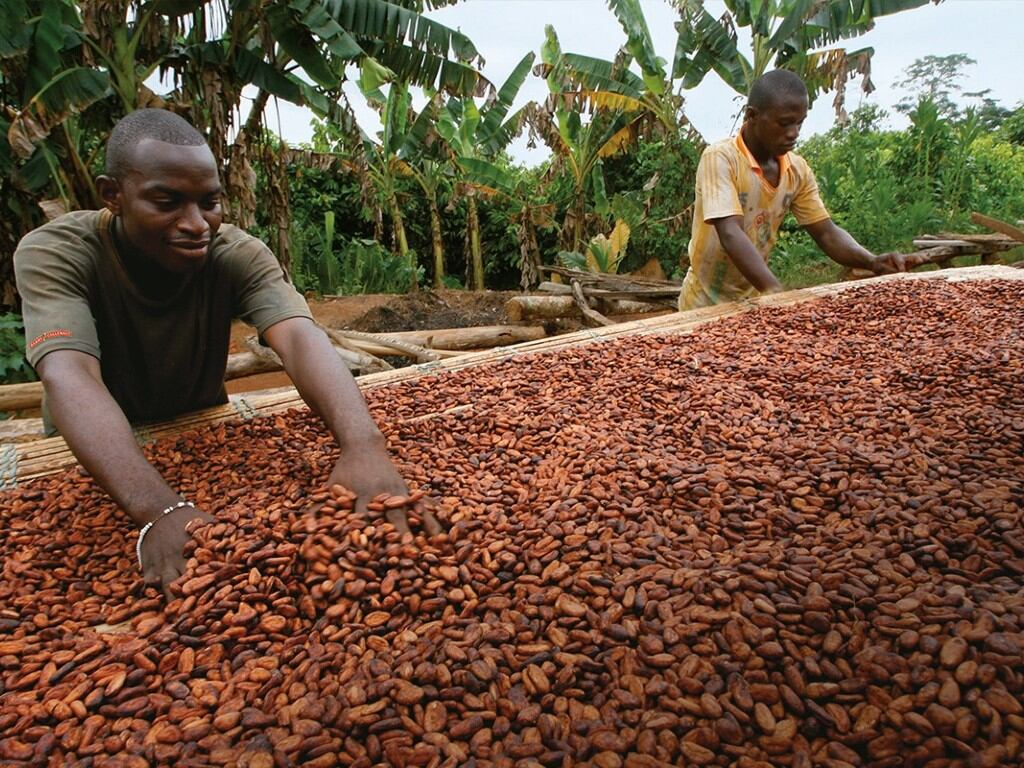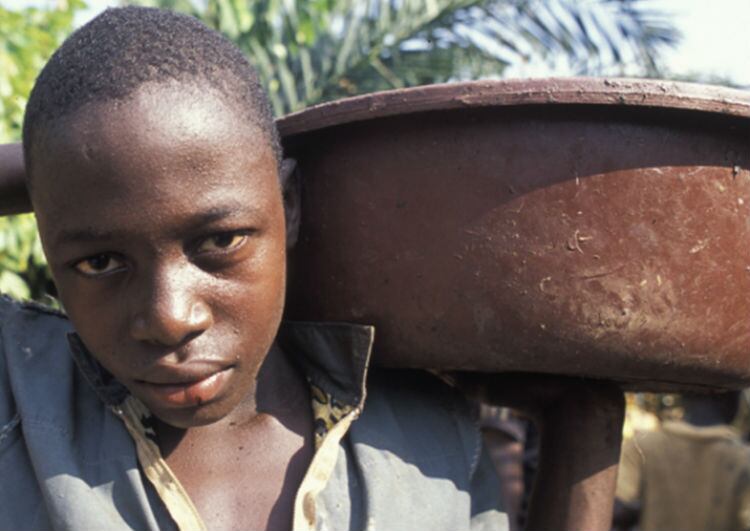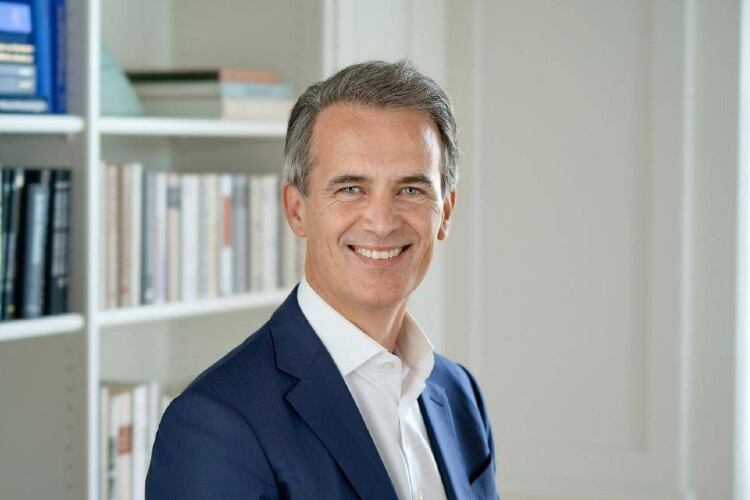In a statement, the Group said: 'Our progress data in 2020-21 shows that we have continued to scale our efforts and create impact … with 214,584 cocoa farmers estimated to be out of poverty in our direct supply chain.'
Forever Chocolate is based on four ambitious targets: Prospering farmers; Zero child labour; Thriving nature; and Sustainable chocolate
Another key achievement highlighted in the report is the reduction of Barry Callebaut’s carbon intensity per tonne of product by more than -17% since 2016. In addition, the Group also claims to have made ‘outstanding progress in 2020-21’,to reduce the carbon emissions caused by Land Use Change (LUC). ‘Through the scaling of our traceability and sourcing efforts, we reduced the LUC impact from cocoa cultivation by over -10%,’ it said.
“In 2020-21, we have continued to scale digital innovations, created a novel approach to measure carbon emissions, increased our individualised tailored support to cocoa farmers and developed a new approach to tackling child labour. Our application of leading innovative solutions is clearly paying off,” said Pablo Perversi, Barry Callebaut’s Chief Innovation, Sustainability & Quality Officer; Global Head of Gourmet.
Speaking at a media briefing at Barry Callebaut’s new Group headquarters in Zurich, Peter Boone, CEO of the Barry Callebaut Group, said: “We have made great progress on which we should be proud.” He also reiterated Barry Callebaut’s drive to become carbon positive and forest positive by 2025 and to eradicate child poverty completely from the Group’s supply chain.
Child labour cases
Regarding working conditions on West African cocoa farms, where Barry Callebaut sources 70% its cocoa, the Group reported that it had identified 21,258 number of child labour cases in its supply chain.
The figure is down slightly from the previous year where Barry Callebaut said it unearthed 22,965 cases of child labour in its supply chain.
Family farmer income is widely accepted as one of the main reasons relating to child labour on farms, where children are forced into work, at too young an age or working in hazardous conditions, to help parents with the cocoa crop.
Barry Callebaut said its child labour monitoring and remediation system now covers 237 farmer groups, including 220,878 farmers in Cote d’Ivoire, Ghana and Cameroon.
Regarding living standards, Barry Callebaut said it aims to raise over 500,000 cocoa farmers out of poverty in its supply chain by 2025.
In order to achieve this, it said in the report, ‘it is critical to have an in-depth understanding of the conditions, challenges and potential of the farms and farmers we are working with.’
We are making progress, but we can - and we should do more -- Peter Boone, CEO of the Barry Callebaut Group
Speaking to this publication, Peter Boone said the Group’s fifth Forever Chocolate Progress Report is “a fully transparent reflection on the Group’s commitment to obtain a better income for the farmer … without farmers, no cocoa.”
While he remains actively involved on this topic to make sure that resources are available to keep driving Barry Callebaut’s agenda, he said farmer income is only a small part, another important part is the global market [for cocoa] and Boone says Barry Callebaut is supported by governments in origin countries to work at providing premiums for farmers on top of the market price for cocoa.
Boone also mentioned the push to help farmers to diversify with different crops and achieve more productivity on the farm.
“Don't underestimate the work and effort in this area. We have 1,300 people in an origin country, trying to engage with those farmers on how to improve their productivity and their income.
“We are very transparent, we know where we can have influence, and I think it is always very important to focus where you can have impact.”
Living Income Differential
Boone also reiterated Barry Callebaut’s support of the Living Income Differential (LID), introduced by Cote d’Ivoire and Ghana for all shipments of cocoa by the two countries for starting season 2020-21, to support a minimum cocoa price to their cocoa farmers.
“We are making progress, but we can - and we should do more.”
Boone told ConfectioneryNews that it cannot support the farmers on its own. “We need to have partnerships with governments in origin countries and also in consuming countries. We have always supported the LID because we believe it is another way to secure better pricing for the cocoa for the farmers, but we also acknowledge it is not the only thing and the programme is much broader than that.”
He said one of his guiding principles in business is to be in front of legislation – and he welcomes recent initiatives in the European Union in regards to legislation around deforestation.
We are an impact-led company, we don't do this as a marketing activity -- Pablo Perversi, Barry Callebaut’s Chief Innovation, Sustainability & Quality Officer
Barry Callebaut has also been actively participating in the ‘CocoaTalks’, an EU-led Multi-Stakeholder Dialogue on Sustainable Cocoa, regarding discussions with the EU on any forthcoming due diligence legislation for the industry.
“With leadership, comes responsibility,” said Boone, “but with regards to legal or public policy we need an enabling environment – where it’s clear children should be in school, schools should be available and certain activities kids should never be part of, and we can only have so much influence with this.”
The Group’s extensive farm mapping database has been expanded to cover 234,997 farmers with full data in 2020-21.
‘Over the past five years, we've learned that farm-specific support is more effective than a one-size-fits-all approach. In 2020-21 a total of 125,593 cocoa farmers in Cote d’Ivoire, Ghana, Cameroon, Brazil, Ecuador and Indonesia received Farm Services support’.
Cocoa Horizons
Significant growth in Cocoa Horizons premiums, the Group’s preferred certification programme, generated over CHF28.4m ($30.86 m) in funds, an increase of +63% compared to the previous year.
The premiums from the purchase of Cocoa Horizons cocoa products were also reflected in the increase to 43% (+15%) of the percentage of cocoa and chocolate products sold that contain 100% sustainable cocoa or chocolate.
‘In addition, in fiscal year 2020-21 we sourced 66% of all our non-cocoa ingredients from sustainable sources, an increase of +8% compared to the previous year’, the Group reported.
100% sustainable ingredients by 2025
Barry Callebaut’s Gourmet brands is at the front of the Group’s sustainability charge by spearheading sustainable chocolate innovation and transitioning in the past 12 months to 100% sustainably sourced cocoa or ingredients.
Perversi heads up Barry Callebaut’s Gourmet division and at the briefing he said: “We are an impact-led company, we don't do this as a marketing activity. We want to do it on the ground and that impact is the results that you actually see.
“In sustainability we've been inventing solutions not just in technology terms, but also in carbon accounting terms. You need to know how to deploy carbon accounting in farms and forest restoration projects in all different areas,” he said.
Perversi also said it is a difficult task trying to make an impact in some of the communities Barry Callebaut operates in.
“The majority are smallholder farmers, with four hectares and farming is typically located in remote regions with poor access to social services, such as healthcare or good, quality education, access to water and access to a number of other things are also an issue.
Lifting farmers out of a cycle of poverty is difficult when many don’t have birth certificates or proof of land rights. In the eyes of a bank or finance institution they may as well be a ghost, said Perversi.
Nicolas Mounard, Director Global Farm Services, said: ”It's not a problem of capacity and it's not a problem of knowledge. The farmer knows how to grow cocoa better than anyone and we don't necessarily believe that we need to teach him about how to grow cocoa. We think the problem is one of affordability … of cash and labour being available. And that's how we address it, from an affordability angle."
'Ambitious targets'
Summing up this year’s Forever Chocolate Progress Report, Boone said: “The targets in the Progress Report are ambitious.
“They still make us nervous as they should. They still unleash a lot of energy. They are drivers, not only just internally, but also in the industry and with governments and policymakers.
"It is a complex challenge, which needs great team work … and I believe we will be more impactful not only as Barry Callebaut, but as a whole industry, in the coming years working together.”



